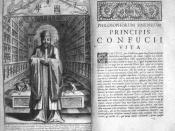Confucianism, like most ideologies, embodies the notion that good begets good; however, unlike many Western religions, the incentive behind proper behavior is neither remuneration nor retribution in the afterlife, it is simply virtue for virtue's sake. With minimal dogmatic teachings, Confucianism has had tremendous influence on the history and government of China, and according to multiple sources, is enjoying a revival there.
Confucius, the Latinization of K'ung Fu Tzu, and posthumously named The Greatest Sage (551-479 BC), was born in the city of Qufu, in the state of Lu (located in what is now the Shantung province) to an unseated noble family who had fled from the state of Song. The Records of the Grand Historian indicate that Confucius was born out of wedlock to a 15 year old mother and 70 year old father, during the Spring and Autumn Period in Chinese history; an era well-known for its moral laxity.
Confucius lost his father early in childhood, and though required to work for a noble family for subsistence, he still managed to find time for studies - something at which he excelled. By age 22, Confucius had established much acclaim for his intellectual and moral capacity and opened a school which attracted many followers (Aiken, 2005).
The basis of Confucius' writings was individual and political morality. He believed a human being attained virtue through altruism and self-control, though again unlike Western religions, Confucius did not believe in complete denial of self, as evidenced by his penchant for music and lyrical poems and the recurrent premise, much like that of Socrates, that education and good manners were paramount to virtuous action. Confucius was ahead of his time in his belief that education and leadership should not be restricted by economic or social class. Confucius also believed the Chinese government...


